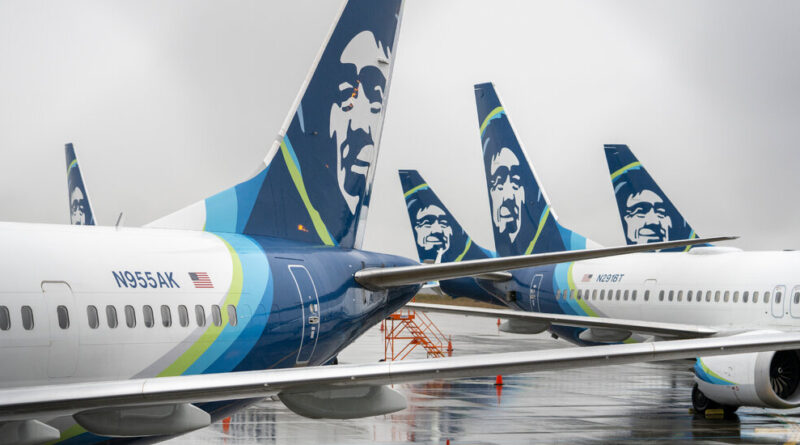737 Max Inspections Delayed as Boeing Revises Guidance
Federal regulators on Tuesday said Boeing was revising its instructions for how airlines should inspect its 737 Max 9, delaying the manufacturer’s effort to get the jet back in the air after a panel in one of the planes blew out during a flight late last week.
The Federal Aviation Administration said the company would change the instructions it had released on Monday based on feedback, but the agency did not provide more details. Instructions on how to comply with F.A.A. rules are often drafted and distributed by airplane manufacturers, with input from airlines and the federal agency to ensure that they can be consistently followed by technicians.
“Upon receiving the revised version of instructions from Boeing, the F.A.A. will conduct a thorough review,” the F.A.A. said in a statement. “The safety of the flying public, not speed, will determine the timeline for returning the Boeing 737-9 Max to service.”
The announcement that Boeing was revising the instructions comes after two airlines reported finding loose parts in the area of the panel that is under inspection.
On Saturday, the F.A.A. had said that it would require inspections of the planes after one such panel was blown out during an Alaska Airlines flight that had taken off from Portland, Ore., the previous day. Although no serious injuries were reported, the incident exposed passengers to powerful wind and raised fresh concerns about Boeing’s quality control practices. The incident has also forced airlines operating the Max 9 to cancel scores of flights.
The blowout is the latest in a string of setbacks for Boeing, which has struggled to regain the public’s trust after two crashes involving the Boeing 737 Max 8 in 2018 and 2019 killed 346 people.
It was not immediately clear how Boeing’s initial plan fell short. The company said on Monday morning that it had shared instructions with airlines on how to inspect the affected panel, also referred to as a door plug, that covered the space where an exit door would otherwise be installed. Hours later, the F.A.A. said it had “approved a method to comply” with the agency’s Saturday order, appearing to confirm Boeing’s statement. The inspections are focused on the door plugs, door components and fasteners.
After those announcements, Alaska Airlines and United, the two biggest operators of the Max 9, said that they had found loose parts during preliminary inspections of the panel.
Investigators at the National Transportation Safety Board have recovered the door plug from the Alaska Airlines plane, but they said on Monday that they were still searching for some related parts.
Boeing’s chief executive, Dave Calhoun, addressed employees at a meeting on Tuesday afternoon, promising transparency in the company’s response.
“We’re going to approach this — No. 1 — acknowledging our mistake,” he said, speaking from a factory in the Seattle area where the company makes planes, including the Max, according to excerpts that Boeing provided. “We’re going to approach it with 100 percent and complete transparency every step of the way.”
Mr. Calhoun, who took charge of the company in January 2020 after his predecessor was forced out during the earlier Max crisis, said the company would work closely with federal investigators. He also said he was overcome when he first saw a photograph from the incident. A teenage boy and his mother, neither of whom had suffered serious injuries, were sitting next to the panel that was blown out.
“I’ve got kids, I’ve got grandkids and so do you,” he said. “This stuff matters. Every detail matters.”
During Friday’s flight, carrying 171 passengers and six crew members, pilots and flight attendants struggled to communicate with one another after the panel blew out. The crew members were surprised when the door separating the cockpit from the passenger cabin flew open, Jennifer Homendy, the chairwoman of the safety board, said during a news conference on Monday night. That subjected the pilots to the strong wind and cabin noise, making it hard for them to hear each other and communicate with air traffic control.
Ms. Homendy said that the cockpit door was designed to open during a rapid decompression event, but that the crew had not been made aware of that feature of the plane. Boeing, she said, planned to make changes to its manual to inform crews.
The Alaska plane was at 16,000 feet when the panel blew out, but the incident could have been much more catastrophic if it had been at a higher altitude. If the plane had been cruising higher than 30,000 feet, passengers could have been moving about the cabin and would have had less time to safely put on oxygen masks and buckle themselves in.
A former F.A.A. acting administrator, Billy Nolen, said in an interview that as a first step the agency would work closely with Boeing to develop a process for making sure all door plugs on 737 Max 9 jets were secured properly.
The result should be detailed instructions that tell airlines how to properly inspect the doors, and complete with diagrams of the pins and bolts that attach the door plugs to the plane. The directive would then be reviewed and approved by the F.A.A. The agency has said it expects airline employees to spend four to eight hours on each plane inspection.
Mr. Nolen, who also previously led the F.A.A.’s aviation safety office, said after the panel blowout on Friday, some airlines began preliminary inspections while they waited for formal instructions from Boeing approved by regulators.
“My understanding is they needed a detailed set of criteria issued by Boeing, approved by the F.A.A.,” he said. “They have to review it and sign off on it.”
Do you work in aviation? The New York Times wants to hear your story. Please share your experiences with us below, and you can learn more about our reporting here. We especially want to hear from people who work for (or used to work for) airports or airlines, or who are part of government agencies that help keep the aviation sector running. We won’t publish any part of your submission without your permission.





